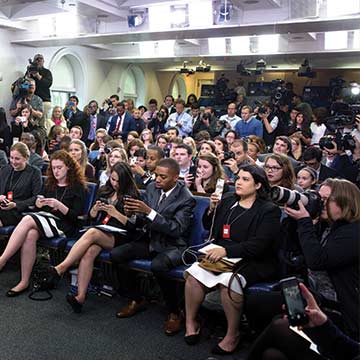When I watch TV coverage of a news conference at the White House, I’m reminded of how reporting resources are disproportionately allocated in today’s news environment. The dozens of journalists at the White House are essentially giving us the same story, while many city council and school board meetings across America are not being covered at all because of cutbacks in local newsrooms.
How much better for our democracy would it be if we could say we had “too many” reporters covering local news? Instead, we have communities dubbed “news deserts,” meaning they don’t have news sites covering public agencies and other essential news that citizens need to make decisions about their local democratic institutions.
Fortunately, there are news leaders working on this issue, and right now philanthropy has become a major funding source for hiring local reporters. Let’s be clear, philanthropy isn’t going to replace the thousands of journalists who lost their jobs because of the broken news business model. But it will help local newsrooms cover their communities.
I recently returned from Raleigh, NC, where I attended a crucial board meeting of Journalism Funding Partners, a non-profit group that is trying to help save local journalism by raising money to pay the salaries of reporters. JFP is one of several organizations working on the challenge. If we don’t, misinformation and disinformation will only going to increase, with a fact-challenged social media pushing these untruths along.
These organizations have made excellent progress, but they must do much more to keep journalists writing about their local communities. I’m thrilled to volunteer on the JFP board, and I believe the many other similar non-profits trying to fund local journalism are making a difference.
It was about three years ago when a few of us came together to see if we could help in a in the small way reverse the fortunes of the news industry by capitalizing on the idea of using philanthropy to fund local journalists. JFP’s founding board members were veteran journalists, intimately knew the impact that exceptional journalism can have in communities.
The idea quickly took fire, and JFP began matching donors with local newsrooms across the nation. JFP became so successful that since 2020, we have helped secure more than $5 million in grants to support local journalism. This includes funding 15 climate reporters in local newsrooms. The stories these reporters are covering would not have been told without this funding.
We deeply believe that local journalism is crucial to our democracy because well-informed citizens make smart decisions about their communities. Conversely, when city councils, school boards and planning commissions hold meetings without reporters telling the public what happened, bad decisions often are made. Studies have shown that politicians spend money more recklessly and government is less efficient in communities where there aren’t journalistic watchdogs.
Look at JFP’s work so far. We are helping fund reporters just about everywhere you look — in Fresno, Sacramento, Modesto, Miami, Fort Worth, Idaho, Kentucky, North Carolina, South Carolina, Georgia and Florida, just to offer a partial list. These are new reporters who would not be there without JFP.
At our meeting in July in Raleigh, our 11-member board began planning our vision for the next five years of JFP. These are some of the best strategic thinkers in the industry. One goal is to put $10 million annually into local journalism. To be clear, this money goes directly to hire reporters, and not for newspaper operations.
I’m confident that JFP will continue to make a major impact in local journalism, and local communities will be better informed because of our work to secure newsroom funding. We raise funds from foundations, major donors and individuals. We also act as the “fiscal sponsor” to allow non-profits groups to direct funding to newsrooms using JFP as the intermediary. This allows donors to make tax-deductible contributions. We operate under strict IRS guidelines.
The money goes to JFP and then to newsrooms, and funders do not have any say on what gets covered, other than the grants are to be used for climate reporters, in that particular example. Newsroom editors make coverage decisions exclusively.
Our board has extensive experience in journalism, education, law, nonprofits and philanthropy. Over the past year, we have hired a full-time executive director, veteran journalist Rusty Coats, and that has allowed us to make great strides as an organization. We are now prepared for the next phase of our work.
Philanthropy isn’t the only answer, but it will help fund local journalism until newsrooms come up with a better model to hire and support local journalists.

Uninformed citizenry? If you are implying that citizens are misinformed by the mainstream media, then I agree. But if you are implying that they are misinformed by America first republicans, then I say you are part of the problem and we don’t need more of your kind. Facebook and Twitter are censoring anyone who doesn’t go along with the left’s propaganda. There are too many lies about covid, vaccines, Trump and the destruction of this country by the Biden administration. If the media wants a communist country then they should all move to a communist country.
LikeLike